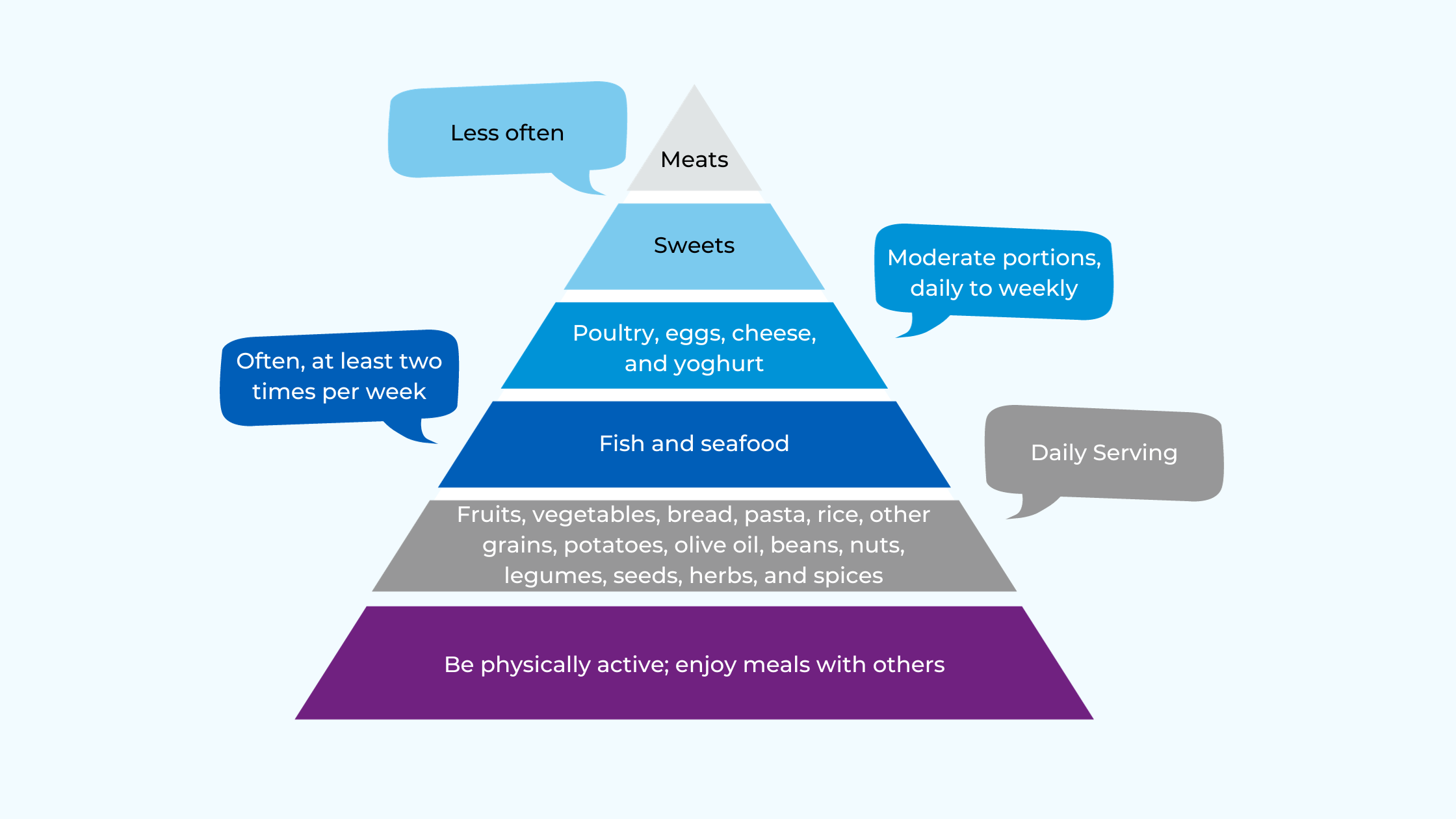Living a healthy lifestyle
Take our 'How Mediterranean is your diet?' quiz to assess your lifestyle and get recommendations for how you can improve your score.
What is a healthy weight?
Body Mass Index (BMI) is a widely used measurement that considers an individual's weight and height to determine if their weight falls within a healthy range.
The calculation is your weight (in kilograms) divided by a multiple of your height (in metres). There are calculators available online to help.
For example, somebody weighing 75kg, with a height of 1.75m would have a BMI of 24.5.
As a general rule of thumb, the following can be used as a guideline for healthy weights:
· <18.5 is underweight
· 18.5 to 24.9 is healthy
· 25 to 29.9 is overweight
· over 30 is obese
It is important to consider that other factors such as ethnicity, muscle mass and underlying healthy conditions can affect what would be an appropriate range for you as an individual.
Diet
It is well known that the population living along the Mediterranean appear to be at much less risk of heart disease than other populations within Europe and the rest of the world. We now understand that this is down to their diet, which can have a huge impact on your overall health.
There are a few key things to take into account when considering dieting and exercise to improve your lifestyle.
Men should aim to intake around 2500 calories, and females around 2000 each day on average
We should eat at least 5 portions of fruit and veg a day (a portion is classed as 80g of fresh fruit or veg, or 30g of dried fruit)
We should drink no more than 14 units of alcohol per week, spread out over several days (for reference, 175ml red wine=2.1 units, pint of lower strength beer= 2 units) with a couple of alcohol free days being advisable
We should aim to exercise every day where possible – just once or twice a week can reduce the risk of heart disease and stroke
What is a Mediterranean diet?
The Mediterranean diet primarily consists of unsaturated fats (such as olive, peanut, canola, and sunflower oils), as well as nuts, walnuts, flax seeds, and fish. It is complemented by a low intake of meat and dairy products.
What makes up a Mediterranean diet?
Healthy fats like olive oil and nuts,
Legumes,
Variety of fruits and vegetables,
Low amounts of red meat and dairy,
Higher intake of seafoods(especially white or oily fish),
Whole grains
PillTime Immune Booster
Combine these three supplements to give your system the best chance this winter with ingredients that could help you fight off infections quicker and maintain your general health.
-
1 per day / £0.13 per tablet
If you're not sure which nutrients your body needs right now, then a Multivitamin is a good all-round solution.
Contains: Vitamin C (Ascorbic Acid), Vitamin E, Vitamin B3, Vitamin A, Vitamin B5 , vitamin K2, Vitamin D3, Vitamin B6, Vitamin, Folic Acid 200μg, Vitamin B12 (Cyanocobalamin) (100% RI)
-
1 per day / £0.13 per tablet
Vitamin C is found in many foods like citrus fruits and leafy greens. But it is water-soluble, so the body cannot store it for long. Our tablets can help your body get the Vitamin C it needs.
Vitamin C promotes many health benefits. It is involved in the creation of Collagen, essential for the structure of cartilage and healthy joints. It is a powerful antioxidant helping to protect cells from damage caused by free radicals. Vitamin C is known to support wound healing and a healthy immune system. It also enhances the absorption of Iron in the gut and is a good accompaniment to Iron supplements.
-
1 per day / £0.07 per tablet
These small tablets play a big role in helping our bodies absorb Calcium. That’s important for strong bones and teeth, and also muscle function and a healthy immune system. Between the end of September and early April, our bodies cannot get enough Vitamin D naturally from the sun. So this supplement can give you a welcome boost.


